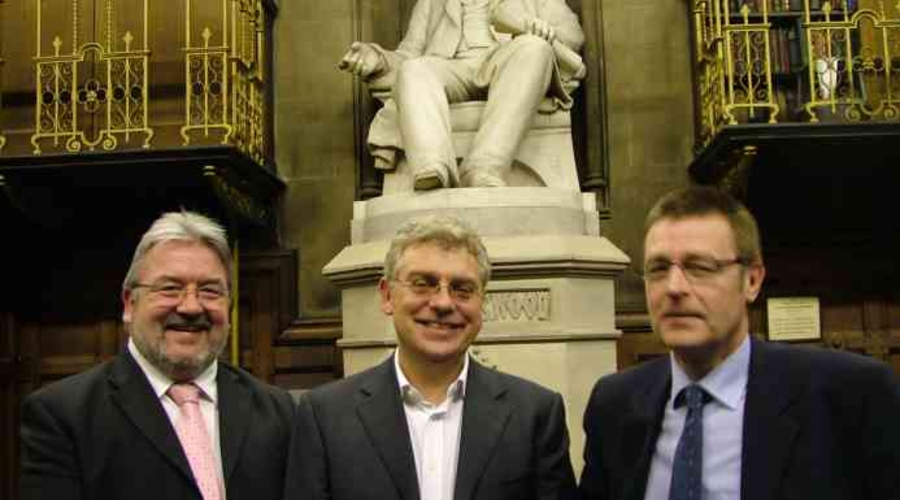Tom Gutteridge (centre) with Graeme Thompson (Chair of NE&TB Centre, left) and Paddy Merrall (MD, ITV Border), in the Mining Institute Library
Today's successful producer is at the cutting edge of popular culture W and knows how to distribute through many different platforms. That recipe for success, given at this year's annual RTS Keynote Lecture by Tom Gutteridge, will be vital as digital switchover accelerates media change over the next two years.
"By the time Border stops transmitting terrestrially, just two years from now, we'll be in a new world." No longer will TV programmes be different from programmes for the internet. In many cases, TV material will simply be a promotional tool for other content
Tom was speaking after one year's gardening leave W which had allowed an opportunity to travel, research and think. "A successful producer senses a change in popular taste and reflects it in a new format before his competitors." Daisy Goodwin had it right – surf the zeitgeist. "Popular culture no longer has any borders."
Jamie Oliver achieved this by responding to concerns about obesity. Tom predicted current trends we're likely to see reflected in formats: back to basics, life is too complicated. Simplify your life. Become more ecological.
"Now I could do all these as easily in Newcastle as London. The future in the North East could be very rosy indeed. Costs are relatively cheap, ideas are plentiful. But you must keep your rights."
Is Content King? Or just a pawn in a multi-channel multi-platform world? Tom believed that the Consumer is King. The growth of broadband and power of downloads gave us much more control over what we choose to watch. "I now spend more in a month than I spend on DVDs in a year". You can watch downloads on trains, planes, cars, taxis, in the toilet. Content can be seen anywhere and everywhere.
The clever producer spots communities of interest. Robot Wars was one of Tom's past programmes –a surprise success because it tapped into an audience already out there but not served. The producer then spots overlaps of communities, in the same way that Amazon moves consumer from one product to the next by suggesting further tempting things to buy.
This is the significance of the cable-Virgin deal. "They want to be able to reach you wherever you are. You have to think beyond conventional terrestrial networks to new platforms and channels or your business will never get started."
TV is just part of a wider range of ways to reach the public that even includes books, magazines, stage plays. Mobile phones can have tiny bits of extra conversation W secret extra W not seen on main TV programme. Design it to be seen at the bus stop.
But who will make? And who will own? Yahoo's Terry Semmel said: Owning stuff is key W not creating it. Tom gave the example of Virgil the check-in man he met at New Zealand airport. Virgil shoots and edits his own material, like an increasing number of people around the world. He's even just bought an HD camera.
Ed Pugh asked what the iPod world meant for channel controllers. Tom's reply: "The scheduler is dead. Marketing is now much bigger art." Did he support the licence fee? Tom defended it. His mother was a great fan of BBC Four W but people like her could never support it financially via subscription. "That is a political decision. I'm very comfortable with the value for money of the BBC."
Garth Jeffrey asked: how local can content go? Tom felt it could be a lot more local. He criticised John Birt who once told him that it was not the BBC's function to do broader regional broadcasting W it was ITV's. Local broadcasting is under-developed in the UK. But the terrestrial broadcasters faced a big fall in audiences and budgets at digital switchover. Even Border with its high loyal audiences would be affected W and in 2012 when London joins, the effect would be huge.
Turning to the challenges of running independent production houses, he said two of the biggest problems now are control of brand and retention of a creative team. "Indies are now finding it very hard to keep creative talent."
He gave his audience an example of the danger of ignoring the cultural foibles of potential audiences. His production Fire and Ice starring Torvill and Dean never sold in the USA. The reason? He had not been aware of the aversion of US networks to showing male buttocks. The skimpy outfits in this production revealed endless shots of Christopher Dean's rear W eight times per second in the spins. So one of the most expensive TV productions ever W he took 130 staff to Stuttgart for the shoot W missed out on a vital market. A memorable cautionary tale.
By Olwyn Hocking
For a full transcript of the evening, click here (broken link)

